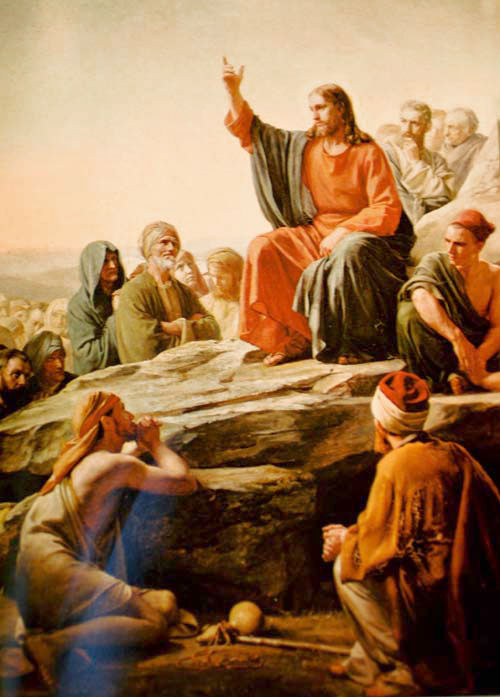In the season of Lent, we reflect on the way we are supposed to be living as Christians.
Jesus calls us to become like him, more and more, little by little, each day. And the way we come to know him is by following the path he sets before us in the Gospels and in the liturgy and teachings of his Church.
“Come and see,” Jesus says to his disciples in the Gospel. This is both a command and a promise. If we come to him and follow him, he will show us who he is and what he is about.
When we accompany Jesus — when we walk with him in our daily lives, when we pray with him and reflect on his words and example in the Gospel — we see the values he lives by. The values of the Kingdom he is calling us to build on earth.
These are the Beatitudes. The Beatitudes are his “way” of being in the world; they describe his character, his attitudes and outlook on life. And the Beatitudes give us a kind of program for our own lives.
As we reflect on the second and third Beatitudes — blessed are those who mourn and blessed are the meek — we need to remember that these blessings of Jesus are part of a single way of life, a path that he calls us to follow.
In the Beatitudes, Jesus is not talking about categories of people. He is not bestowing his blessings on some people who are in mourning and others who are meek.
Instead, in the Beatitudes, Jesus is telling us what qualities we need to have if we want to follow him.
Jesus wants us to mourn for the sin of the world — and the suffering and injustice caused by sin. For Jesus, mourning is not a passive reaction to what we see around us. He is not calling us to sit around crying and feeling sorry for the way things are.
The Gospels show Jesus weeping twice. Once at the grave of his friend Lazarus. And once near the end of his life, as he drew near Jerusalem and considered the suffering that would come to the city.
The tears of Jesus became waters of healing. His mourning became the source of new life. In his weeping, he raised Lazarus from the dead. In his cries and tears on the Cross, he turned the city’s sorrows to joy and opened the way to a “new Jerusalem.”
In the same way, as we follow Jesus, our mourning must be life-giving, our sorrow an act of solidarity.
In saying, “Blessed are those who mourn,” Jesus commands us to be compassionate. To suffer with the suffering. To bind their wounds and help them bear their burdens.
St. Paul translated this Beatitude as: “Weep with those who weep.” In mourning the sin of the world, we are called to follow Jesus in resisting injustice and delivering our neighbors from cruelty and evil.
The third Beatitude, “Blessed are the meek,” is also a demand of our Christian identity. Again, Jesus is our model. He said, “Learn from me, for I am meek and humble of heart.”
For Jesus, meek does not mean weak. The great Old Testament leaders, Moses and David, and the Messiah hoped for by the prophets — all were described as “meek.”
So “meekness” gives us a window into the power of God.
God’s power is different than the world’s power. God does not save the world by aggression or force. Jesus came into this world little and unnoticed, a tiny baby born in the manger of the poor. He was crucified in weakness.
In calling us to be meek, Jesus calls us to trust that God’s weakness is stronger than anything in this world. He calls us to be confident that God is still working out his loving plan of salvation in the world, even in the face of the world’s evil and anguish.
Jesus calls us to play our part in this plan of redemption. But he wants us to use God’s means — the spiritual weapons of love and prayer, self-denial and nonviolence — not the means of this world.
To be meek is not to be passive in the face of evil. Jesus was mocked and scorned on the Cross. He responded not in anger but in love — praying for those who persecuted him. So we too are called to master our anger and passions, and to overcome evil with good.
As we continue our Lenten journey this week, let’s keep praying for one another. And let’s ask Mary our Mother to help us to imitate Jesus in his gentle humility of spirit and to help save others by the power of our love and goodness.
Archbishop Gomez’s book, “Immigration and the Next America,” is available at the Cathedral Gift Shop (www.olacathedralgifts.com/immigrationandthenextamericarenewingthesoulofournation.aspx). Follow him at www.facebook.com/ArchbishopGomez.

